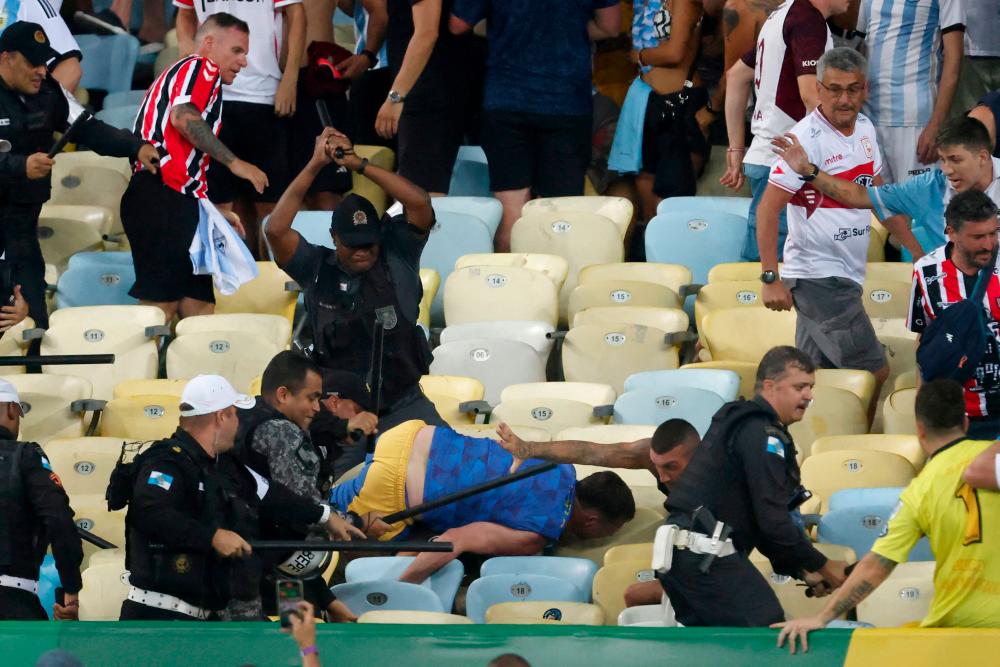The FIFA World Cup 2026 is set to be one of the most anticipated events in the world of soccer, and behind the glitz and glamour of this prestigious tournament lies the FIFA World Cup 2026 Organizing Committee. This dedicated committee plays a crucial role in ensuring the smooth operation and success of soccer’s biggest event. From selecting host cities to coordinating logistics, marketing, and security measures, the organizing committee works tirelessly to create an unforgettable experience for players, fans, and viewers worldwide. Join us as we delve behind the scenes to uncover the intricate planning and coordination efforts of the FIFA World Cup 2026 Organizing Committee.
Introduction: Unveiling the FIFA World Cup 2026 Organizing Committee
The FIFA World Cup 2026 Organizing Committee plays a crucial role in orchestrating one of the most anticipated sporting events globally. With meticulous planning and strategic decision-making, this committee ensures the smooth execution of the tournament.
Key Responsibilities of the Committee
The committee oversees venue selection, match scheduling, logistical arrangements, and ticketing processes to guarantee a seamless experience for players and fans alike.
- Ensuring compliance with FIFA regulations
- Collaborating with local authorities
- Managing communication with participating teams
Committee Members and Expertise
The FIFA World Cup 2026 Organizing Committee comprises experienced professionals from various fields, including sports management, event planning, marketing, and logistics.
Each member brings unique skills and insights to the table, contributing to the overall success of the event.

History and Evolution of the FIFA World Cup
The FIFA World Cup is the most prestigious soccer tournament globally, with a rich history dating back to 1930. The tournament has evolved significantly over the years, starting with just 13 teams participating in the inaugural event held in Uruguay.
Expansion of Teams and Nations
Throughout the years, the FIFA World Cup has undergone numerous expansions, with the most recent being the inclusion of 48 teams starting from the 2026 edition. This significant change allows more nations to participate and showcase their talent on the global stage.
Technological Advancements
Technology has played a crucial role in the evolution of the FIFA World Cup. From the introduction of goal-line technology to the implementation of Video Assistant Referees (VAR), each edition brings new advancements that aim to improve the fairness and accuracy of the game.
The Road to Hosting: Selection Process for FIFA World Cup 2026
Organizing the FIFA World Cup 2026 involves a meticulous selection process overseen by the FIFA World Cup 2026 organizing committee. Cities and stadiums submit bids, which are evaluated based on various criteria.
Bid Evaluation Criteria
The criteria include stadium readiness, infrastructure, accommodation options, transportation networks, and commitment to sustainability. Each aspect is crucial in determining the host cities for the tournament.
Host City Selection
After the evaluation process, the organizing committee selects the host cities that meet the standards set by FIFA. These cities play a pivotal role in welcoming teams and fans from around the world.

Key Roles and Responsibilities of the Organizing Committee
The FIFA World Cup 2026 Organizing Committee plays a crucial role in ensuring the success of the world’s biggest soccer event. They are responsible for overseeing various aspects of the tournament to ensure everything runs smoothly and according to plan.
Planning and Coordination
The committee is tasked with planning all logistics, including venue selection, scheduling matches, and coordinating with teams and officials. They work tirelessly to ensure that everything is organized efficiently and all deadlines are met.
Logistics and Operations
Managing the logistics and operations of such a massive event is no easy feat. The committee oversees transportation, accommodation, ticketing, security, and medical services to guarantee a safe and enjoyable experience for all participants and fans.
- Coordinate venue operations
- Ensure safety and security measures
- Manage ticketing and fan services

Challenges Faced by the Committee in Organizing the Event
Organizing the FIFA World Cup 2026 is a monumental task for the FIFA World Cup 2026 Organizing Committee. They face numerous challenges, ranging from logistical issues to communication hurdles.
Lack of Infrastructure
The committee faces the challenge of ensuring that all host cities have the necessary infrastructure in place to host such a massive event. This includes stadiums, transportation networks, and accommodations.
Budget Management
The committee must carefully manage the budget allocated for the event to avoid overspending. Financial planning and transparency are crucial to ensure the event’s success.
Coordination with various Stakeholders
Coordinating with different stakeholders, including host cities, sponsors, and FIFA itself, poses a significant challenge. Effective communication and collaboration are key to overcoming this obstacle.
Technology and Innovation in Event Planning: Ensuring a Successful Tournament
In the realm of event planning for the FIFA World Cup 2026, the organizing committee is leveraging cutting-edge technology and innovative strategies to guarantee a seamless and successful tournament.
Virtual Reality Venue Mapping
Utilizing virtual reality technology, the committee can create interactive venue maps that aid in efficient layout planning and crowd management.
AI-Powered Chatbots for Attendee Support
Implementing AI-powered chatbots enables swift and personalized assistance for attendees, enhancing their overall experience during the event.
Sustainability Initiatives: Greening the FIFA World Cup 2026
The FIFA World Cup 2026 Organizing Committee is dedicated to implementing various sustainability initiatives to reduce the environmental impact of the event.
Renewable Energy Sources
The committee aims to power the event using renewable energy sources such as solar and wind power, reducing reliance on traditional energy sources.
Carbon Neutrality Plan
As part of their commitment to sustainability, the organizing committee has developed a carbon neutrality plan to offset the carbon emissions generated during the World Cup, ensuring a more environmentally friendly event.
Legacy of the FIFA World Cup 2026: Impact on Soccer and the Host Country
The FIFA World Cup 2026, organized by the FIFA World Cup 2026 Organizing Committee, left a lasting impact on soccer and the host country. The tournament featured thrilling matches, record-breaking performances, and unforgettable moments that captivated fans worldwide.
Boost in Soccer’s Global Popularity
The FIFA World Cup 2026 acted as a catalyst for boosting soccer’s global popularity. With billions of viewers tuning in to watch the matches, soccer gained new followers and enthusiasts across diverse regions. The tournament showcased the universal appeal and unifying power of the beautiful game.
The FIFA World Cup 2026 solidified soccer’s position as the most popular sport in the world, inspiring future generations of players and fans.
Host Country’s Economic Growth
The FIFA World Cup 2026 brought significant economic benefits to the host country. The influx of tourists, investments in infrastructure, and promotion of local businesses during the event contributed to a boost in the host country’s economy. Local communities experienced increased revenue from tourism and hospitality sectors.
The legacy of the FIFA World Cup 2026 generated long-term economic growth opportunities and enhanced the host country’s global profile.
Global Fan Engagement Strategies: Connecting Fans to the Event
Engaging fans globally is a key focus for the FIFA World Cup 2026 organizing committee. By leveraging innovative technologies and social media platforms, the committee aims to create a seamless connection between fans and the event, enhancing the overall fan experience.
Virtual Fan Zones
Virtual fan zones are set up to allow fans from all over the world to come together virtually and participate in interactive activities, watch live streams, and engage with other fans in real-time. This fosters a sense of community and excitement leading up to the event.
Creating virtual fan experiences amplifies engagement.
Social Media Campaigns
Utilizing social media platforms such as Facebook, Instagram, Twitter, and TikTok, the committee runs engaging campaigns to keep fans informed about the latest updates, player profiles, behind-the-scenes content, and interactive challenges. Social media acts as a powerful tool to reach a global audience and drive excitement.
- Regular social media updates keep fans connected.
- Social media contests foster engagement.
Frequently Asked Questions
-
- What is the role of the FIFA World Cup 2026 Organizing Committee?
- The FIFA World Cup 2026 Organizing Committee is responsible for planning, organizing, and overseeing all aspects of the FIFA World Cup 2026, which is one of the biggest sporting events in the world.
-
- Who are the members of the FIFA World Cup 2026 Organizing Committee?
- The FIFA World Cup 2026 Organizing Committee consists of individuals from various backgrounds including sports management, event planning, marketing, and logistics. These members work together to ensure the successful execution of the tournament.
-
- What are some key responsibilities of the FIFA World Cup 2026 Organizing Committee?
- Some key responsibilities of the FIFA World Cup 2026 Organizing Committee include selecting the host cities, coordinating with FIFA and other stakeholders, managing budgets, overseeing marketing and promotional activities, and ensuring the safety and security of participants and spectators.
-
- How long does the FIFA World Cup 2026 Organizing Committee prepare for the event?
- The FIFA World Cup 2026 Organizing Committee typically starts preparations years in advance to ensure that all aspects of the event are meticulously planned and executed. This involves everything from venue selection to logistical arrangements and marketing strategies.
-
- What challenges does the FIFA World Cup 2026 Organizing Committee face?
- The FIFA World Cup 2026 Organizing Committee faces various challenges such as managing complex logistics, meeting FIFA’s strict requirements and standards, handling unforeseen circumstances like weather disruptions or security threats, and ensuring a memorable experience for fans and participants alike.
Final Thoughts: Unveiling the FIFA World Cup 2026 Organizing Committee
In conclusion, delving into the realms of the FIFA World Cup 2026 organizing committee has uncovered the intricate planning and meticulous coordination required to host soccer’s most significant event. Witnessing the dedication, passion, and expertise of the committee members sheds light on the immense effort put forth behind the scenes. As the world eagerly awaits the tournament, the organizational prowess and commitment of the committee stand as a testament to their unwavering dedication to making the event a resounding success. The collaboration, innovation, and attention to detail showcased by the committee set the stage for a truly unforgettable FIFA World Cup in 2026.

